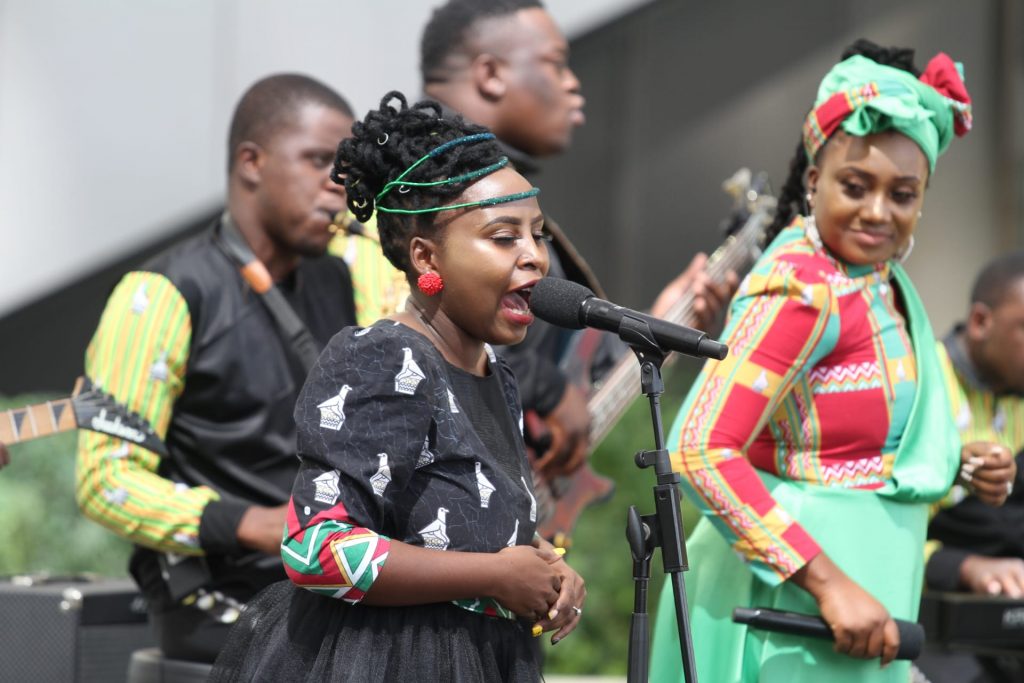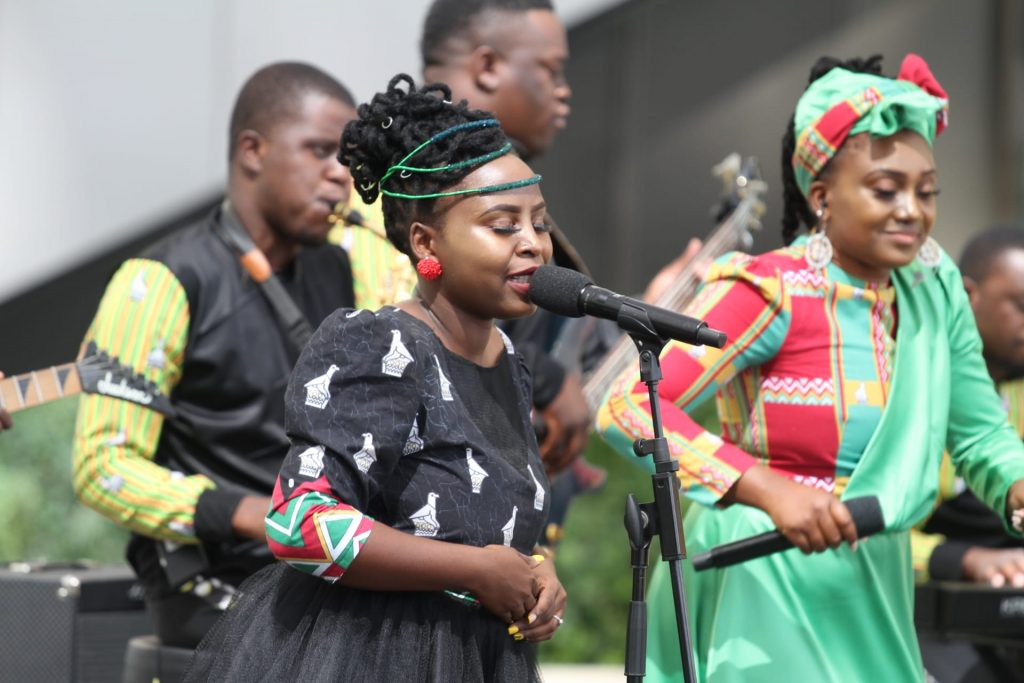Lady Tshawe
The Oasis in Bulawayo has recently appointed a multi-talented creative to be part of the chief staff. Nomatshawekazi Michelle Sangiweyinkosi Damasane popularly known as Lady Tshawe is an award-winning theatre actress, scriptwriter, director, acclaimed poet, and dancer.
The Oasis interviewed her about life as a creator.
How is your transition from dealing with mainly artists to dealing with all sorts of creators?
It’s totally new for me but still exciting because I feel like I can make mistakes and learn from them. I have never done it before and I never thought I would see myself in an office. However, I feel like I have always been on this journey as an artist. I think I’m taking a risk and people are taking a risk by hiring me at The Oasis.
Which form of art still spikes your adrenaline?
Acting! I love telling stories through adopting a character and creating mannerisms for that person, creating an accent for them and a wardrobe for them. It’s no longer me it’s a different person and it’s their story. I find that exciting because there are some things that I sometimes get shy to talk about as Tshawe but if you give me that same topic as a character …I’m able to express it more than I could as myself. So if someone says there’s a role for me, I’m there because I love telling stories that way. It can be tiresome and draining emotionally but going through the process is amazing for me.


What drives your creativity?
I’m driven by my main objective which is to inspire young people to pursue their dreams and to ensure that every time I meet people doing my artistry I leave a message of hope and love. It’s my way of showing kindness to people so I always try and strive to inspire, give hope, and love every time I am performing or delivering work.
What makes you different from other artists?
What makes me a cut above the rest is the amount of work I put into a project, if it means depriving myself of sleep so that a project is done a hundred and ten percent I’ll do just that. I know I’m not naturally talented so I work extra hard to make up for that because there are people that I work with who are so talented and they don’t have to do much. Yes, I will make mistakes but I learn from that. Also, I’m always ready to learn and willing to take risks to do a project even if there’s no money in it.
Do you ever take on gigs that won’t pay you?
Of course, there are some projects I will agree to do because of the level of social capital and the relationship but more often than not, I will ask for the dollar sign, I ask what’s in it for me or what am I getting because I also have a family to feed? At the end of the day, it’s my livelihood, I can’t always do it because I’m passionate about it and exposure doesn’t pay the bills.
Do you think you’ve reached your level of success?
I haven’t started, to be fair I feel I’m only beginning to make sense of my career. Of course, I’ve had good moments in the industry but I haven’t reached the pinnacle point where I say ‘now I’m successful’. I have succeeded in most of the goals I’ve laid down but I’m nowhere close to where I want to be.
What’s your major goal, one that you think brings you close to your success level?
One of the major things is having a theatre academy. We have a couple of theatre academies but they cannot hold the capacity of artistic talent in this country specifically for Bulawayo and Matebeleland. So I would love to build an accessible theatre that hosts performances and theatrical shows but also trains young people who want to venture into the theatre.
How do you balance being a top-rated artist and taking people under your wing?
I think for me it’s knowing how I started. When I came into the art sector someone took me under their wing, they showed me around, taught me the ropes of the Bulawayo entertainment industry, gave me opportunities, and took a risk on me. That’s the reason why I always find it easy to connect young artists to people that could take them even further. I’m always about giving and taking, someone took a chance on me and I learned something from them, now I need to share that with other people.
What’s your advice for a young artist who has been discouraged by COVID-19?
If it means having to do something unrelated to your passion to ensure that you can finance it, do it but don’t let your dream die. Of course, it’s hard with COVID-19, we are trying to find our footing with all these regulations and how to create art with it but it’s not impossible, it’s doable and we are learning.
Just give yourself space and time to learn and, find new ways of doing it, and always look for someone to open up to and help you manoeuvre the industry. Discouragement can come from not having someone to talk to or go to for advice, so it’s not always that you need money, you might just need someone to bounce off ideas to.
You advocate for females through Nhimbe Trust, can we say you are a feminist?
I wouldn’t call myself a hundred percent feminist but I am all about women empowerment and human empowerment so whatever cause there is that empowers people I’m there. But because I’m female I have a bias toward women and I would love to see more women in decision-making positions.
We know you are a poet, what are your thoughts on the Hip-hop industry, and would you like to be a part of it?
I listen to it and do respect it because it’s conscious music but wouldn’t see myself rapping. The main reason is that my poetry is different; it doesn’t rhyme as such so it would be difficult to try and put it on a beat, especially a Hip-hop beat. The last time I tried rapping I bit my tongue but I have tried working with different Bulawayo Hip-Hop artists. I get involved with Hip-Hop through collaboration, when someone wants me to come and throw in some poetry, I work on it and be part of it.
What’s that one question that you wish people would ask you?
OH, I’ve never thought about what I would like to be asked. Maybe…how it is to be a public figure and still manage to keep your life private? Or maybe why is it that people don’t see you in a lot of public places but you’re such a public figure?
Would you like to answer that question?
I’m an introverted extrovert, I love people but sometimes I get drained. So if I’m not performing at a certain place, I’m probably at home watching the concert online and I paid for the ticket just to support the artist. And I think that’s the reason why people don’t see much of me because I just love being at home. I love to catch up on my series and just entertain myself at home.
Also for brand alignment, one thing I have learned throughout my career is that it’s important where you place yourself or where you spend most of your time because in most places people see lady Tshawe and not Noma. Hence sometimes I limit my where I go because I don’t want to offend people who love my work and I want my brand to still have that respect.
What’s your favourite series?
It was Criminal Minds. Fun fact, growing up I always wanted to either be a doctor or a cop, I was interested in homicide things. But I realized science and maths were too much work for me so I decided that I will do what I’m good at and that was the arts but I always immerse myself in crime and med series.
What challenges have you faced throughout your career?
The first challenge was getting into directing, curating shows, and administration which was a predominantly male-dominated space. I was just trying to assert my position; people kept doubting my abilities and telling me I’m better off sticking to being on stage performing.
Also, having qualifications felt like a threat to some of the people that I worked with.
I have also had instances where people try to take advantage of me by asking for sexual advances because I am a female.
How did you deal with being asked for sexual advances?
I am stubborn, tough, and can be harsh with such people so when they approach me I always tell them off. I have learned that if you are too soft, you can never be heard and people won’t take you seriously because they can mistake you for a pushover. Moreover, I am a go-getter, I don’t have to give sexual advances to be afforded an opportunity because my brain is enough, I’m qualified to do it and I work hard.
When did you feel like giving up?
During the first two to three years (2012-2014) of my career, I was still trying to learn the ropes and I felt like I always had to prove myself. I had previously learned at a private school and I was afforded certain privileges but now I had to work with people that learned on the other side of town. They used to call me ‘coconut’ (a term used to accuse someone of betraying their race, or culture, by implying that, like a coconut, they are brown on the outside but white on the inside) and I also couldn’t fit in with the white people because I’m black -ngiliNdebele-. So that was difficult for me to navigate because I had to prove myself to both sides.
There were many times when I would get home, cry and tell my mom that I didn’t want to do art anymore. I would ask her if I could go back to South Africa where I think I could try and make it. It was a time when I felt like most of my enthusiasm was crashed, and I actually started looking for a job as a teacher of music and drama. Nonetheless, I learned that I am strong and can withstand such pressures.
What’s your ‘go-to’ thing when you face challenges?
I drink tea and sleep. When I sleep, I rest and when I wake up I have a better way to deal with my challenges or a better way to approach them because I’m now calm. Also, I have people to talk to when I face challenges.
Lady Tshawe’s experiences and successes in the art industry can be an encouragement, to keep pursuing your goals no matter what.